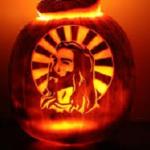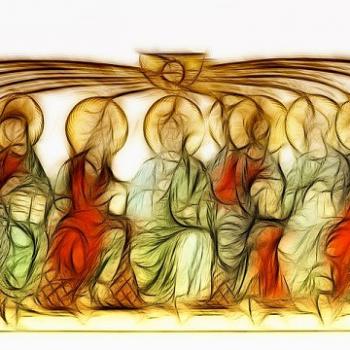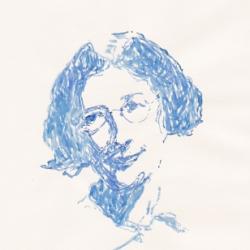Last Friday was All Saints Day, which is usually celebrated on the first Sunday of November–making today All Saints Sunday. Here’s what I wrote about All Saints Sunday in my book A Year of Faith and Philosophy. I am currently reading through the copyedited manuscript that I received from the publisher ten days or so ago–I’ll be sending it back to them in a couple of days. Typesetting and marketing are next!

November 1 is All Saints’ Day; when it falls on a weekday All Saints is frequently celebrated on the first Sunday of November. Singing the hymn “For all the saints” is a must; readings for the day from Revelation provide visions of “a new heaven and earth” in which countless throngs of saints and angels worship continuously before the throne of God.
I come from a hardcore Protestant world in which we did not do saints. Even though I have spent much of my adult life, first as a graduate student, then as a professor, as a non-Catholic in Catholic higher education, I am still somewhat confused by and uncomfortable with the very notion of “sainthood.” In Albert Camus’s novel The Plague, one of the main characters, when described as a “saint” by another character, responds that “sanctity doesn’t really appeal to me . . . What interests me is being a man.” I agree with that sentiment. What makes a person a saint? Is there such a thing? Is there a difference between sainthood and moral excellence? Is sainthood a reasonable goal for a human life, or is it something one stumbles into?
A recurring character in Louise Penny’s Inspector Gamache series of mysteries raises the saint issue in an interesting way. Dr. Vincent Gilbert abandoned a lucrative medical career to live in and care for a community of people with Down syndrome. Based on that experience he wrote a book called Being, by all accounts a memoir of staggering honesty and humility.
Dr. Gilbert abandoned his family to enter this community, walking back into their lives years later to find that his alienated son and wife want nothing to do with him. Dr. Gilbert is temperamental, a contrarian by nature, very full of and in love with himself, and is generally disliked by everyone in town. These contradictions have earned him the title “The A**hole Saint” among his family and acquaintances who know and don’t love him.
In Bury Your Dead, Vincent is living in a cabin deep in the Québec woods because his family refuses to have him at their hotel and spa in town. Inspector Beauvoir, another recurring character in the series who is recovering from serious gunshot wounds received a few weeks earlier, finds himself in the cabin after Vincent rescues him from a snowmobile mishap. As Vincent tenderly cares for the feverish Beauvoir, the inspector compares his current situation to his previous medical care over the past weeks.
He’d been touched by any number of medical men and women. All skilled personnel, all well intentioned, some kind, some rough. All made it clear they wanted him to live, but none had made him feel that his life was precious, was worth saving, was worth something . . . [Vincent’s] healing went beyond the flesh, beyond the blood. Beyond the bones.
The ability to recognize the value and dignity in another person, regardless of their status or situation, is one of the hallmarks of a healer—and perhaps a saint.
Less than a page after Inspector Beauvoir’s observations about Vincent’s healing abilities, the men enjoy a meal together while listening to a hockey game on the radio. Before long Vincent says something judgmental and nasty about Beauvoir’s culinary preferences, as much in character as Vincent’s tender care a page earlier. “The a**hole was back,” Beauvoir notes. “Or, more likely, had been there all along in deceptively easy company with the saint.”
When Camus’s character in The Plague says that he is more interested in being a man than in being a saint, he might be drawing a false distinction. Saintliness does not require rising above one’s humanity or leaving it behind; rather, sainthood is entirely compatible with being human—warts and all. Raising saints to the level of veneration removes them from the daily human grind and places them beyond the reach of reasonable human aspiration.
It is good to know that Thomas Aquinas had an eating disorder and that Mother Teresa of Calcutta could be a pain in the butt and was hard to get along with, because such information reminds us that saints are human beings. Taking it a notch higher, being reminded of Jesus’s divinity immediately causes me to think about his humanity—warts and all (yes, I suspect Jesus had warts). The excellence that sainthood represents is a matter of being fully human. Each of us can learn to see another person as more than a problem to be avoided or solved, to be attentive to the other in the manner that their humanity deserves. Each of us can learn to be healers, in other words—even if we still occasionally are a**holes. That’s what incarnation is all about.
For reflection: Is sainthood something a person of faith should aspire to, or is it something that is a byproduct of committing one’s life to Christ?













